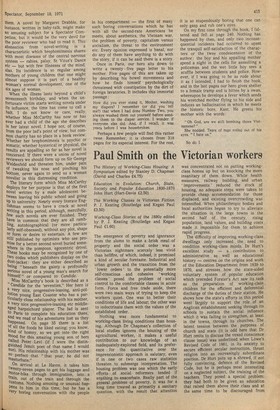Paul Smith on the
The History of Working-Class Housing: A Symposium edited by Stanley D. Chapman (David and Charles £4.75)
Education in Evolution: Church, State, Society and Popular Education 1800-1870 John Hurt (Hart-Davis £2.50)
The Working Classes in Victorian Fiction P. J. Keating (Routledge and Kegan Paul £3.50)
Working-Class Stories of the 1890s edited by P. J. Keating (Routledge and Kegan Paul £1.60)
The emergence of poverty and ignorance from the slums to make a brisk meal of property and the social order was a Victorian nightmare scarcely less vivid than hellfire, of which, indeed, it promised a kind of secular foretaste. Industrial and urban growth and the transition from the 'lower orders' to the potentially more self-conscious and cohesive 'working classes ' posed the problem of social control to the comfortable classes in acute form. Force and free trade aside, there were two main ways of trying to keep the workers quiet. One was to better their conditions of life and labour; the other was to indoctrinate them with the values of the established order.
Nothing was more fundamental to working-class living conditions than housing. Although Dr Chapman's collection of local studies ignores the housing of the agricultural worker, it makes a useful contribution to our knowledge of an inadequately-explored field, and its preference for the quantitative over the impressionistic approach is salutary, even if in one or two cases raw statistics threaten to submerge interpretation. The housing problem was one which the early efforts of social reformers tended if anything, to exacerbate. Really part of the general ,problem of poverty, it was for a long time treated as primarily a sanitary question, with the result that attention it is so stupendously boring that one can only gasp and rub one's eyes.
On my first time through the book, I faltered and fell at page 240. Nothing has happened by then, and only two inconsequential incidents had occurred to upset the tranquil self-satisfaction of the characters or the twee condescension of the author : the boy and his appalling mother spend a night in the cells for assaulting a policeman and the wet little boy sees a scuffle between students and police. However, if I was going to be as rude about it as 1 intended, I had to finish the book, and in the last pages our hero gives shelter to a female tramp and is bitten by a swan, whereupon he develops a fever which sends his wretched mother flying to his side and induces an hallucination in which he meets the historic bore, Kant. He greets his mother with the words :
" Oh God, are we still bombing those Vietnamese?"
She nodded. Tears of rage rolled out of his eyes. "I hate us."


































 Previous page
Previous page